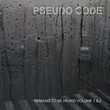|
|

Pseudo Code EE Tapes released the Pseudo Code album The Radio's On last year. In our review the band was described as 'a hard-hitting trio that only existed for a little more than two years, 1980 to 1982, covering post punk, industrial and experimental music, as young aspiring independent musicians ought to indulge in back then'. The description holds for yet another historical release by the band. The members were Xavier S (main lyricist, vocals, Indian flute and a little bit guitar here), Guy Marc Hinant (guitar, keyboards, a little bit drums and assorted) and Alain Neffe (some lyrics, keyboards, saxophone and assorted including rhythm box operator). Guy Marc and Alain had previously played in Kosmose that you also can read about in this moonth's menu. I think the two of them played together for some moonths after Kosmose before Xavier joined and Pseudo Code got going. Remains To Be Heard Vol. 1 and Vol. 2 were originally released on two cassettes by Alain on his Insane label in 1984 and 1986 respectively. The tapes have been dusted and improved for the digital launch and include three long bonus tracks. EE Tapes wrote that The Radio's On was an 'album not only fascinating for Pseudo Code connoisseurs, but for everyone with open ears and mind'. I think this is even more fitting for Remains To Be Heard. You really need open ears and mind, to enjoy this. The album is not for the faint-hearted and might scare the uninitiated away. There is a quotation from Pseudo Code on several pages on the net that describes what the trio was into: 'We play potlatch music which is emotional music, or more accurately emotional sounds, because we are not musicians.' At first I didn't understand what this was about. In English potlatch is a feast practiced by Indians of the northwest coast of Canada and the United States. But it means something completely different for the French speaking: 'Potlatch est un label français indépendant qui enregistre les artistes les plus représentatifs de la musique librement improvisée'. To my limited French this indicates that Pseudo Code played emotional, free and improvised sounds. And some music, too. At first listen around half of the emotional tracks of this double CD sounded pretty harsh, with ugly, distorted, metallic and unmelodic synth sounds often with echo effects. And the vocals tended towards the shouting kind, also frequently treated with echo or other effects. It's not easy to detect what the lyrics deal with apart from the song titles. "Little Big Man" is one example with chaotic and ugly synth and radio sounds, distorted flute, echoed occasionally shouting vocals that grows wilder towards the middle of the "song". I don't get any associations to the classic film of the same name starring Dustin Hoffman. As the title suggests, the more than 11 minutes instrumental "Névrose Obsessionnelle" with drum machine, hard synths and bleeps might get on your nerves... But this is not all. After repeated listening the album doesn't sound that harsh and ugly anymore. The majority of the tracks are of a lighter kind than described above, or stand out in other ways. Some are more relaxed, some with restrained vocals, some really harmonic, a few closer to jazz-noise, a couple with funny noises and humorous inventions and quite a few closer to traditional synth-pop. The short and merry instrumental "Democracy Leads To Excess... Fascism Too" even in direction of Alain's, at the time, soon to be new synth-pop duo BeNe GeSSeRiT. So the conclusion must be that the live music of Pseudo Code has many facets. This is not the ideal album to scare away unwanted guests at your home after all. Only a few tracks are suitable in this sense. On the other hand, for the newcomers I recommend to start with one of Pseudo Code's studio albums. Copyright © 2015 JP
|
| You may also want to check out our Pseudo Code article/review: The Radio's On. |
| © 2015 Luna Kafé |